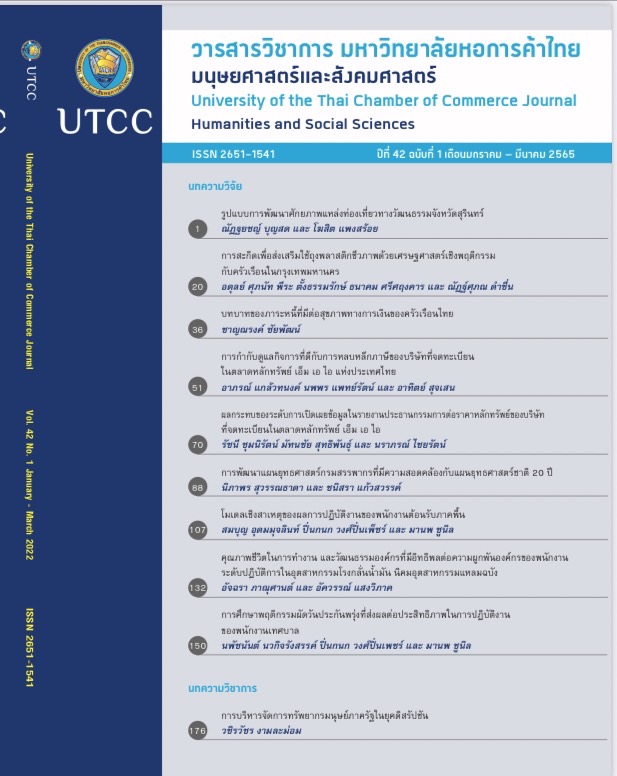Good Corporate Governance and Tax Avoidance of Listed Companies in the Market for Alternative Investment (MAI) of Thailand
Main Article Content
Abstract
The objective of this study was to find out the relationship between good corporate governance and tax avoidance of listed companies in the Market for Alternative Investment (MAI) of Thailand. The data was collected from the financial statements and annual reports during year 2015-2019 of 488 companies. The multiple regression method was used to find out the relationship between good corporate governance and tax avoidance of Listed Companies in the Market for Alternative Investment (MAI) of Thailand. The study of good corporate governance consists of the ownership structure and the board of directors’ structure. Tax Avoidance was measured by effective tax rate (ETR) and the ratio of income tax to total assets (TAX/ASSET). The results found positive relationship between board size and tax avoidance of listed companies in the Market for Alternative Investment (MAI) of Thailand.
Article Details

This work is licensed under a Creative Commons Attribution-NonCommercial-NoDerivatives 4.0 International License.
ลิขสิทธิ์ของบทความ
ผลงานที่ได้รับการตีพิมพ์ถือเป็นลิขสิทธิ์ของมหาวิทยาลัยหอการค้าไทย ห้ามมิให้นำเนื้อหา ทัศนะ หรือข้อคิดเห็นใด ๆ ของผลงานไปทำซ้ำ ดัดแปลง หรือเผยแพร่ ไม่ว่าทั้งหมดหรือบางส่วนโดยไม่ได้รับอนุญาตเป็นลายลักษณ์อักษรจากมหาวิทยาลัยหอการค้าไทยก่อน
References
จิตอุษา ขันทอง และกัลยกิตติ์ กีรติอังกูร. (2560). การกำกับดูแลกิจการและผลการดำเนินงานของบริษัทจดทะเบียนในตลาดหลักทรัพย์แห่งประเทศไทย. วารสารบริหารธุรกิจศรีนครินทร์วิโรฒ, 8(2), 42-54.
ธัญพร ตันติยวรงค์. (2552). การศึกษาปัจจัยที่มีอิทธิพลต่อการวางแผนภาษีและความสัมพันธ์ระหว่างการวางแผนภาษีกับมูลค่าของกิจการ: หลักฐานเชิงประจักษ์จากประเทศไทย (วิทยานิพนธ์ ปริญญาดุษฎีบัณฑิต ไม่ได้ตีพิมพ์). จุฬาลงกรณ์มหาวิทยาลัย, กรุงเทพฯ.
นิพัฒน์ โพธิ์วิจิตร. (2555). ผลกระทบของโครงสร้างผู้ถือหุ้น คณะกรรมการและคณะกรรมการตรวจสอบที่มีต่อการบริหารกำไรของบริษัทจดทะเบียนในตลาดหลักทรัพย์แห่งประเทศไทย (วิทยานิพนธ์ปริญญาดุษฏีบัณฑิต ไม่ได้พิมพ์). มหาวิทยาลัยธุรกิจบัณฑิตย์, กรุงเทพฯ.
บดินทร์ มหาวงศ์ และไพบูลย์ ผจงวงศ์. (2562). ความสัมพันธ์ระหว่างผลการดำเนินงานและการหลบหลีกภาษีเงินได้นิติบุคคลของบริษัทที่จดทะเบียนในตลาดหลักทรัพย์แห่งประเทศไทย ในกลุ่ม SET 100. วารสารเกษตรศาสตร์ธุรกิจประยุกต์, 13(18), 15-40.
รสนา โชติสุวรรณ และสุภา ทองคง. (2562). ความสัมพันธ์ระหว่างการวางแผนภาษีกับราคาหุ้นของบริษัทจดทะเบียนในตลาดหลักทรัพย์แห่งประเทศไทย. RMUTT Global Business and Economics Review, 14(1), 23-35.
สมศักดิ์ ประถมศรีเมฆ, กรวิภา เทียนภาสกร, จัญจลา ศิวะมาศ และขวัญนุช เจริญวัฒนวิญญู. (2559). ปัจจัยที่ส่งผลต่ออัตราภาษีเงินได้นิติบุคคลที่แท้จริง กรณีศึกษาจากตลาดหลักทรัพย์แห่งประเทศไทย. วารสารการจัดการธุรกิจ มหาวิทยาลัยบูรพา, 5(1),101-111.
สัตยา ตันจันทร์พงศ์. (2558ก). การกำกับดูแลกิจการ การบริหารกำไร และการวางแผนภาษีที่มีผลกระทบต่อมูลค่ากิจการของบริษัทจดทะเบียนในตลาดหลักทรัพย์แห่งประเทศไทย. ใน การประชุมทางวิชาการของมหาวิทยาลัยเกษตรศาสตร์ ครั้งที่ 53: สาขาศึกษาศาสตร์, สาขาเศรษฐศาสตร์และบริหารธุรกิจ, สาขามนุษยศาสตร์และสังคมศาสตร์ (น. 422-431). กรุงเทพฯ: มหาวิทยาลัยเกษตรศาสตร์.
สัตยา ตันจันทร์พงศ์. (2558ข). การกำกับดูแลกิจการที่ดีมีอิทธิพลต่อผลการดำเนินงานผ่านการวางแผนภาษีของบริษัทจดทะเบียนในตลาดหลักทรัพย์แห่งประเทศไทย. Journal of the Association of Researchers, 20(2), 105-112.
สัตยา ตันจันทร์พงศ์ และรัชนียา บังเมฆ. (2560). อิทธิพลของคณะกรรมการบริษัท คณะกรรมการตรวจสอบ และโครงสร้างการถือหุ้นที่มีผลต่อการวางแผนภาษี หลักฐานเชิงประจักษ์จากประเทศไทย.วารสารวิชาชีพบัญชี, 13(37), 29-44.
สุชาดา ศรีสกลกิจ. (2558). ความสัมพันธ์ระหว่างการกำกับดูแลกิจการที่ดีกับการวางแผนภาษีของบริษัทจดทะเบียนในตลาดหลักทรัพย์แห่งประเทศไทย กลุ่ม SET 100 (การศึกษาส่วนบุคคลปริญญามหาบัณฑิต ไม่ได้ตีพิมพ์). มหาวิทยาลัยธรรมศาสตร์, กรุงเทพฯ.
Abdelfattah, T., & Aboud, A. (2020). Tax avoidance, corporate governance, and corporate social responsibility: The case of the Egyptian capital market. Journal of International Accounting, Auditing and Taxation, 38, 100304. https://doi.org/10.1016/j.intaccaudtax.2020.100304
Alkurdi, A., & Mardini, G. H. (2020). The impact of ownership structure and the board of directors’ tax avoidance strategies: Empirical evidence from Jordan. Journal of Financial Reporting and Accounting, 18(4), 795-812.
Annisa, N. A., & Kurniasih. L. (2012). Effect of corporate governance on tax avoidance. Journal Akuntansi and Auditing, 8(2), 95-189.
Annuar, H. A., Salihu, I. A., & Obid, S. N. S. (2014). Corporate ownership, governance and tax avoidance: An interactive effects. Procedia-Social and Behavioral Sciences, 164,150-160. https://doi.org/10.1016/j.sbspro.2014.11.063
Dewi, G. A. P., & Sari, M. M. R. (2015). Effect of executive incentives, corporate risk and corporate governance on tax avoidance. E-Journal Akuntansi Universitas Udayana, 13(1), 50-67.
Fadhilah, R. (2014). Pengaruh good corporate governance terhadap tax avoidance (Studi empiris pada perusahaan manufaktur yang terdaftar di BEI 2009-2011). Journal Akuntansi, 2(1)1-22.
Han, K. C., & Suk, D. Y. (1998). The effect of ownership structure on firm performance: Additional evidence. Review of Financial Economics, 7(2), 143 -155. https://doi.org/10.1016/S1058-3300(99)80150-5
Hasan, I., Kim, I., Teng, H., & Wu, Q. (2017). The effect of foreign institutional ownership on corporate tax avoidance: International evidence. Helsinki: Bank of Finland.
Khurana, I. K., & Moser, W. J. (2009). Shareholder investment horizons and tax aggressiveness. Retrieved from https://ssrn.com/abstract=1517913
Kurniasih, L., & Suranta, S. (2017). Earnings management, corporate governance and tax avoidance: The case in Indonesia. Journal of Finance and Banking Review, 2(4), 28-35.
Minnick, K., & Noga, T. (2010). Do corporate governance characteristics influence taxmanagement? Journal of corporate finance, 16(5), 703-718.
Oxelheim, L., & Randoy T. (2003). The impact of foreign board membership on firm value. Journal of Banking and Finance, 27(12), 2369-2392.
Richardson, G., Taylor, G., & Lanis, R. (2013). The impact of board of director oversightcharacteristics on corporate tax aggressiveness: An empirical analysis. Journal of Account Public Policy, 32(3), 68-88.
Sefiana, E. (2009). Pengaruh Penerapan Corporate Governance terhadap Manajemen Laba pada perusahaan Perbankan yang telah go public di BEI. Journal Ekonomi Bisnis dan Akuntansi Ventura, 12(3), 211-222.
Tandean, V. A., & Winnie, W. (2016). The effect of good corporate governance on tax avoidance: An empirical study on manufacturing companies listed in IDX period 2010-2012. Asian Journal of Accounting Research, 1(1), 28-38.
Tang, T. Y. (2020). A review of tax avoidance in China. China Journal of Accounting Research,13(4), 327-338. https://doi.org/10.1016/j.cjar.2020.10.001
Winarsih, R., Prasetyono., & Kusufi, M. S. (2014). Pengaruh good corporate governance and corporate sosial Responsibility terhadap tindakan pajak agresif: Studi pada erusahaan manufaktur yang Listing di BEI tahun 2009-2012. n.p.
Zhang, C., Cheong, K.-C., & Rasiah, R. (2016). Corporate tax avoidance and performance: Evidence from China’s listed companies. Institutions and Economies, 8(3), 61-83.


